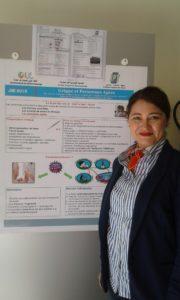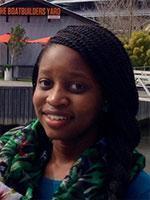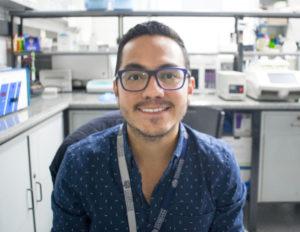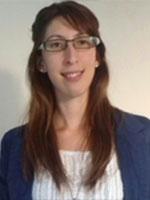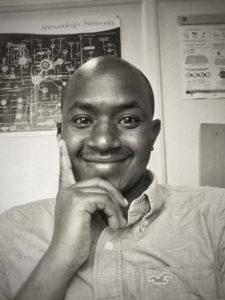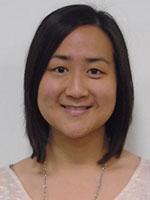December 2018
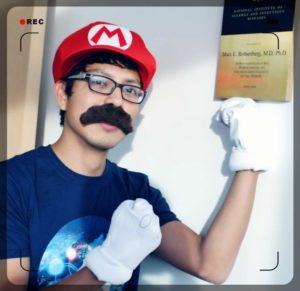 Our December Ambassador of the month is Mario Alberto Ynga Durand from the Instituto Politecnico Nacional, Mexico. Mario joined the Immunopaedia Ambassador program this year, and has already contributed to initiative in the short time he has been with us. Thank you for your hard work, Mario.
Our December Ambassador of the month is Mario Alberto Ynga Durand from the Instituto Politecnico Nacional, Mexico. Mario joined the Immunopaedia Ambassador program this year, and has already contributed to initiative in the short time he has been with us. Thank you for your hard work, Mario.
Name: Mario Alberto Ynga Durand
Position: Clinical Research Fellow
Research Institute: Instituto Politecnico Nacional Mexico.
Research Interests: Mucosal Immunology and Vaccine development
Recent Publication:
Azouz NP, Ynga-Durand MA,et al., 2018. The antiprotease SPINK7 serves as an inhibitory checkpoint for esophageal epithelial inflammatory responses. Sci Transl Med.
Why do you love immunology: The possibilities of translating basic research into clinical practice are enormous in the field. Understanding the immune system is necessary for harnessing its power!
If I wasn’t an immunologist I would be: Farmer (agriculture is fascinating) or Librarian (nice lifestyle!)
Tips for young people who want to enter the field of immunology: Don’t lose the clinical correlation!
What being an Immunopaedia Ambassador means to me: A great way to attract talented and curious people to the field.
How I have contributed to Immunopaedia so far: Too little to be showcased! But I recommend the interview that I conducted on Prof. Van Damme from VAXINFECTIO. I also wrote breaking news articles on Resident CD8 T cells in His elite controllers and What’s behind Eosinophilic Esophagitis? (summary of recent publication)
You can get in touch with me by: ResearchGate
November 2018
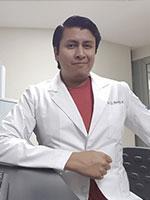 Our November Ambassador of the month is José L. Maravillas-Montero from the Research Support Network, National Autonomous University of Mexico. José has made an enormous contribution towards spreading the word of Immunopaedia. He was part of the team of Ambassadors that conducted interviews at the ALAI/IUIS meeting in May this year, specifically Susan K Pierce‘s interview. Thank you for your hard work, José.
Our November Ambassador of the month is José L. Maravillas-Montero from the Research Support Network, National Autonomous University of Mexico. José has made an enormous contribution towards spreading the word of Immunopaedia. He was part of the team of Ambassadors that conducted interviews at the ALAI/IUIS meeting in May this year, specifically Susan K Pierce‘s interview. Thank you for your hard work, José.
Name: José L. Maravillas-Montero
Position: Associate Professor
Research Institute: Research Support Network, National Autonomous University of Mexico.
Research Interests: B cell biology, Autoimmune diseases
Recent Publications:
- Maravillas-Montero JL, Acevedo-Ochoa, 2018. Human B Regulatory Cells: The New Players in Autoimmune Disease. Rev Invest Clin. 2017
- Pérez-Martínez CA, Maravillas-Montero JL, et al., 2017. Tspan33 is Expressed in Transitional and Memory B Cells, but is not Responsible for High ADAM10 Expression. Scand J Immunol.
- López-Herrera G, Maravillas-Montero JL, et al., 2015. A novel CD40LG deletion causes the hyper-IgM syndrome with normal CD40L expression in a 6-month-old child. Immunol Res.
Why do you love immunology: Because it is a field that is always changing. Almost every day a new discovery about a different cell subset, a novel soluble modulator or a new function for something that was traditionally circumscribed to only performing a given thing, is emerging. In this way, you can always create new hypothesis and test your ideas.
If I wasn’t an immunologist I would be: I always wanted to be an architect, but at some point, I had to decide and here I am!
Tips for young people who want to enter the field of immunology: Find your niche! Immunology is a very competitive field; it is not bad to be interested in the mainstream topics around but there is a lot of interesting and neglected subjects that few people are interested in and they could represent opportunity areas where a young scientists could make an impact.
What being an Immunopaedia Ambassador means to me: I think is a great networking opportunity to establish contact with people around the globe. Also, I’m a teacher, a task that I really enjoy, so representing and being immersed in this outstanding educational initiative is very helpful.
How I have contributed to Immunopaedia so far: I interviewed Dr. Susan K. Pierce at ALAI-SMI meeting and also promoted the website at every opportunity.
You can get in touch with me by: e-mail: maravillas@cic.unam.mx; ResearchGate
October 2018
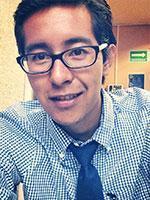 Our October Ambassador of the Month is Juan Carlos Balandrán, PhD Candidate at the Centro de Investigación Biomédica de Oriente (IMSS-Puebla) Puebla, México. Juan Carlos has made an enormous contribution to Immunopaedia this year. He was part of the team of Ambassadors that conducted interviews at the ALAI/IUIS meeting in May this year. He co-authored a summary of the Flow Cytometry workshop preceding the meeting, as well s conducting and editing some of the ALAI/SMI interviews featured in our newsletter and Youtube Page. Thank you Juan Carlos for the hard work.
Our October Ambassador of the Month is Juan Carlos Balandrán, PhD Candidate at the Centro de Investigación Biomédica de Oriente (IMSS-Puebla) Puebla, México. Juan Carlos has made an enormous contribution to Immunopaedia this year. He was part of the team of Ambassadors that conducted interviews at the ALAI/IUIS meeting in May this year. He co-authored a summary of the Flow Cytometry workshop preceding the meeting, as well s conducting and editing some of the ALAI/SMI interviews featured in our newsletter and Youtube Page. Thank you Juan Carlos for the hard work.
Name: Juan Carlos Balandrán Juárez
Position: PhD in Molecular Biomedicine
Research Institute: Centro de Investigación Biomédica de Oriente (IMSS-Puebla) Puebla, México. In English: Eastern Biomedical Research Center of Mexican Security Social Institute, Puebla, Mexico.
Research Interests: Malignant bone marrow microenvironment
Recent Publications:
- Kourtis N, Charampos L, Hockemeyer K, Balandrán JC et al., 2018. Oncogenic hijacking of the stress response machinery in T cell acute lymphoblastic leukemia. Nature Medicine.
- Balandrán JC, et al., 2017. Pro-Inflammatory-Related Loss of CXCL12 Niche Promotes Acute Lymphoblastic Leukemic Progression at the Expense of Normal Lymphopoiesis. Frontiers in Immunology.
- Balandrán JC, et al., 2016 Analysis of normal hematopoietic stem and progenitor cell contents in childhood acute leukemia bone marrow.Arc Med Res.
Why do you love immunology: Because the biggest successful in Medicine has been due to Immunology, viruela eradication happened thanks to vaccination. I think Immune system is the most fascinating tissue, since their ontogeny until the action of effector cells.We have learned a lot from this system like stem cell models, plasticity and specification of responses that are paradigms which can be applied to other models.In fact, current efforts in precision medicine are focusing on the immune system like CAR-T cells technology, regulatory T cells and dendritic cells to control diseases.
If I wasn’t an immunologist I would be: Definitely a Chef, just because I really love cooking.
Tips for young people who want to enter the field of immunology: I learned from my mentors that discipline is the base of successful. I suggest you stay extremely close to your lab and other lab members and maintain good communication with your mentor. Discuss your data! the more experience you have in explaining your results with your colleagues is going to be easier write your reports. Attend seminars! even if it content is not pure immunology, you don’t even know if you can collaborate with other colleagues in other fields. Participate in Scientific Meetings with poster or oral presentations, you won’t know if your next paper-reviews are going to hear you 😉 Do trainings in other labs, all experience that you will gain is going to give you and your research to other level.
What being an Immunopaedia Ambassador means to me: Immunopaedia is the best platform to stay connected with other colleagues and stay tuned to novel discovers in Immunology. For me, represent a personal compromise to spread immunology in my institution, during my classes and seminars. Is a honor position and I’m very proud to be an Immunopeadia Ambassador.
How I have contributed to Immunopaedia so far: I collaborated with Jennifer Enciso (other Immunopedia Ambassador) in the Oncoimmunology-Mexico content and I’ve contibuited with some interviews to very recognized Immunologists like Dr. Alberto Mantovani, Dr. Paul Frenette and Dr. Alberto Orfao.
You can get in touch with me by: e-mail: jcbalandran@gmail.com ; Research Gate: ; Facebook: JC Balandrán ; Twitter: @jc_balandran ; Instagram: jcbalandran
September 2018
Our September Ambassador of the Month is Mouna Ben Azaiz, Assistant Professor in Immunology, University of Tunis El Manar, Faculty of Medicine Tunis, Tunisia (working in Military Hospital of Tunis). Mouna joined the Immunopaedia team this year, and has contributed to the Interviews page, and has also promoted Immunopaedia at her institute.. Thank you Mouna for all your hard work.
Name: Mouna Ben Azaiz
Position: Assistant Professor in Immunology
Research Institute: University of Tunis El Manar, Faculty of Medicine Tunis, Tunisia (working in Military Hospital of Tunis)
Research Interests: Inflammation, Sepsis, Bioethics
Recent Publications:
- Bedhiafi T, Charradi K,Ben Azaiz M, et al., 2018. Supplementation of grape seed and skin extract to orlistat therapy prevents high fat diet-induced murine spleen lipotoxicity. Appl Physiol Nutr Metab.
- Ben Azaiz M, et al., 2017 Immune suppression in severe infection: level of immunosuppressive cytokine IL10 and IL4 during sepsis and correlation with sequential organ failure assessment. Pan African Medical Journal – Conference Proceedings.
- Ayari J, Balti M, Ben Azaiz M, et al., 2017. The role of cytokines IL10, IL6 and TNFα as potential prognostic markers in breast cancer in Tunisia, European society for medical oncology (ESMO)–Immunology 7-10 December 2017 Geneva, Switzerland, Annals of oncology.
Why do you love immunology: Immunology is the future of medicine I call it the molecular medicine. My dream is that one day we can conquer cancer with immunotherapy, and find a way to control the reaction of the immune system to prevent sepsis.
The history of medicine started by exploring anatomy, and now thanks to technology we can explore our cells’ molecules and genome. And now nanotechnology allows us to direct treatments directly to affected regions.
It is a wonderful adventure in a mysterious world and every day we make new discoveries.
If I wasn’t an immunologist I would be: Artist
Tips for young people who want to enter the field of immunology: You must study some basic skills, but it is more important to be creative and have imagination. Read the old books of famous scientists. I learned so much from them. Always stay humble and share your knowledge.
What being an Immunopaedia Ambassador means to me: I feel a duty to teach people the importance of caring for their immune systems, and to spread public awareness about immunotherapies. Being an Ambassador is a great opportunity to express my love for immunology and share my modest expertise and visions in this field, as well as to learn from others.
How I have contributed to Immunopaedia so far: I promoted immunopeadia during Immunology Day in April 2018, and interviewed Prof Jean-Marc Cavaillon, Proffessor at Institut Pasteur in Paris.
You can get in touch with me by: LinkedIn – Mouna Ben Azaiz
August 2018
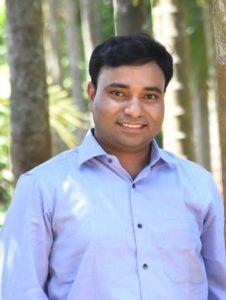 Our August Ambassador of the is Rushikesh Patil, Post-Doctoral Fellow at theINSPIRE Faculty, supported by Dept. of Science and Technology, Govt. of India. Rushikesh joined the Immunopaedia team this year, and has contributed to the Breaking news page. Thank you Rushikesh for all your hard work
Our August Ambassador of the is Rushikesh Patil, Post-Doctoral Fellow at theINSPIRE Faculty, supported by Dept. of Science and Technology, Govt. of India. Rushikesh joined the Immunopaedia team this year, and has contributed to the Breaking news page. Thank you Rushikesh for all your hard work
Name: Rushikesh Patil
Position: INSPIRE Faculty, supported by Dept. of Science and Technology, Govt. of India
Research Institute: Advanced Centre for Treatment Research and Education in Cancer (ACTREC) – Tata Memorial Centre, Navi Mumbai
Research Interests: Research interest: Tumour immunology, immune dysfunctions in cancer patients, metabolic regulation of immune cells’ function
Recent Publications:
Patil RS, et al., 2017. Immunosuppressive role of γδ T cells in cancer: The other side of the coin. Translational Cancer Research.
Patil RS, et al., 2016. IL17 producing γδ T cells induce angiogenesis and are associated with poor survival in gallbladder cancer patients. International Journal of Cancer.
Patil RS, et al., 2015. The Jekyll and Hyde story of IL17 producing γδT (Tγδ17) cells. Frontiers in Immunology.
Dar AA, Patil RS, et al., 2014. Insights into the relationship between toll like receptors and gamma delta T cells responses. Frontiers in Immunology.
Why do you love immunology: Because Immunology teaches us to fight for right. As the immune system has inherent tendency to battle for providing protection to the host, it gives me motivation and courage to conquer the challenges. The immune system strategically uses arsenal of ammunitions in the form of immune cell subtypes, secreted soluble factors and immune effector mechanisms to protect us from pathogenic invaders. The intelligent nexus of different immune compartments, although complex to understand, regulate the immune response like a coveted military operation. It gives me a thrilling experience to resolve a mystery behind the failure of such a competent system during disease condition.
If I wasn’t an immunologist I would be: Science student!
Tips for young people who want to enter the field of immunology: Welcome to Immunology. It is not a single subject but encompasses many facets of health sciences. It has a potential to revolutionize the medical treatment strategies as we have noticed the success of vaccines in infections and immunotherapy in cancer treatment. First ask yourself whether you like reading immunology articles. Identify the niche you are comfortable with. More you read more you benefit. Discuss with colleagues and seniors about every experiment, exciting or disappointing results, any new article you come across and ask questions. Always fuel your passion but at the same time be open-minded. It is really an exciting field if it interests you.
What being an Immunopaedia Ambassador means to me: It’s a valuable opportunity I got to contribute in the noble cause of education. Being an ambassador I am privileged to access the literature available on Immunopaedia and spread this knowledge to others. Being part of Immunopaedia, encourage me to communicate and be more connected with others working in the field of Immunology. I am glad to contribute to the growth of Immunopaedia.
How I have contributed to Immunopaedia so far: I contributed to Immunopaedia by writing a breaking news article on “Metabolic reprogramming: Novel strategy to improve cancer immunotherapy”. I have promoted the website among my friends and colleagues at our centre. I am also promoting breaking news articles by posting them onto my facebook page. I am preparing multiple choice questions for an article on “T cell mediated autoimmune diseases” available on Immunopaedia. I am planning to contribute further by taking interviews of the eminent immunologist visiting the institute.
You can get in touch with me by: email: rpatil@actrec.gov.in, Researchgate
July 2018
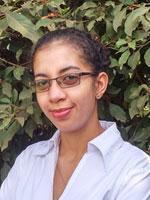 Our July Ambassador of the Month is Vicky Gent, Graduate Assistant at the Jomo Kenyatta University of Agriculture and Technology, Kenya. Vicky joined the Immunopaedia team this year, and has contributed to the Breaking news page. Thank you Vicky for all your hard work
Our July Ambassador of the Month is Vicky Gent, Graduate Assistant at the Jomo Kenyatta University of Agriculture and Technology, Kenya. Vicky joined the Immunopaedia team this year, and has contributed to the Breaking news page. Thank you Vicky for all your hard work
Name: Vicky Gent
Position: Graduate Assistant at the Department of Zoology (Jomo Kenyatta University of Agriculture and Technology)
Research Institute: Institute of Primate Research, Nairobi
Research interests: Immunomodulators, vaccine development, neuroimmunology and currently looking into in silicoimmunology
Why do you love immunology: I love understanding how the immune system protects us. Immunology can blend with a multitude of disciplines and this can result in break-through innovations that can solve many of the world’s health challenges.
If I wasn’t an immunologist I would be: Probably a Veterinarian, or a book store owning coffee barista 🙂
Tips for young people who want to enter the field of immunology: Be flexible and read widely in the field of immunology so that you can get ideas for research. And most importantly, enjoy doing it.
What being an Immunopaedia Ambassador means to me: It’s wonderful being part of a group that focuses on immunology. I have easy access to a wide range of information on immunology which is written in a way that’s very easy to understand. Being part of the team that’s responsible for building this website is really amazing.
How I have contributed to Immunopaedia so far: I have contributed to the Breaking news articles as well as shared the immunopaedia website with my colleagues at the university.
You can get in touch with me by: Researchgate; LinkedIn
June 2018
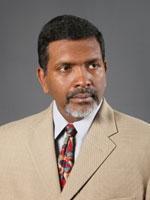 Our June Ambassador of the Month is Natkunam Ketheesan, Professor of Biomedical Sciences at the University of New England, Australia. Natkanum is a recent addition to our Immunopaedia team and has contributed to the Breaking news page. Thank you Natkunam for all your hard work
Our June Ambassador of the Month is Natkunam Ketheesan, Professor of Biomedical Sciences at the University of New England, Australia. Natkanum is a recent addition to our Immunopaedia team and has contributed to the Breaking news page. Thank you Natkunam for all your hard work
Name: Natkunam Ketheesan
Position: Professor in Biomedical Science
Research Institute: University of New England, Australia
Research interests: Investigating host-pathogen interactions in bacterial infections
Recent publications:
Sikder S,… Ketheesan N (2018). Group G streptococcus induces an autoimmune IL-17A/IFN-γ mediated carditis in the Lewis rat model of Rheumatic Heart Disease. Journal of Infectious Diseases.
Morris JL, … Ketheesan N (2016) Devlopment of a diet-induced murine model ofdiabetes featuring cardinal metabolic and pathophysiological abnormalities of type 2 diabetes. Biology Open; 5(8):1149-62.
Gorton D, … Ketheesan N (2016). Repeat exposure to group A streptococcal M protein exacerbates cardiac damage in a rat model of rheumatic heart disease. Autoimmunity 25; 1-8.
Why do you love immunology: My area of research within immunology focuses on host-pathogen interactions in infection. I have also a keen interest in developing and characterising clinically relevant disease models. These models enable us to determine the immunepathological mechanisms involved in thedisease process and the possibly of using these models to develop strategies to either prevent these infections or enhance existing treatment regimes.
If I wasn’t an immunologist I would be: Working as a biologist or a palaeontologist!
Tips for young people who want to enter the field of immunology: They should first consider a few things – if one is not fully committed or enjoy the different aspects of research, afraid of long hours of work and unable to put up with experiments not working the way one thinks they should – then they should never get into research – there aremuch better ways to live a life. However, if they are passionate about immunology research – they should go for it with everything that they have. One should always remember to have an open mind.
What being an Immunopaedia Ambassador means to me: When I was studying immunology as a university student 25 years ago, I could not access much material on the subject. Currently we have information overload and not everything on the web is accurate. Therefore, there is a need for credible provided by sources such as Immunopaedia. Contributing to this endeavour means a lot to me as an academic teaching immunology.
How I have contributed to Immunopaedia so far: I have contributed to “Breaking News” and have encouraged colleagues to become members of Immunopaedia. Additionally I have provided a list of material available on the Immunopaedia web to undergraduate students I teach, so that they can access this material.
You can get in touch with me by: LinkedIn – Natkunam Ketheesan
May 2018
Our May Ambassador of the Month is Thandeka Moyo, Postdoctoral Research Fellow at the National Institute of Communicable Diseases in Johannesburg, South Africa. Thandeka has played a very active role at Immunopaedia by recently contributing to the Breaking news page. Thank you Thandeka for all your hard work.
Position: Postdoctoral Research Fellow
Research Institute: National Institute for Communicable Diseases, South Africa
Research interests: HIV immunology, vaccines, antibodies
Recent publications:
Moyo T et al., Molecular basis of unusually high neutralization resistance in tier 3 HIV-1 strain 253-11. Journal of Virology, 2018.
Moyo T et al., Chinks in the armor of the HIV-1 Envelope glycan shield: Implications for immune escape from anti-glycan broadly neutralizing antibodies. Virology, 2017.
Jacob RA*, Moyo T* et al., Anti-V3/glycan and anti-MPER neutralizing antibodies, but not anti-V2/glycan-site antibodies are strongly associated with higher anti-HIV-1 neutralization breadth and potency. Journal of Virology, 2015.
Why I love immunology: Understanding human immunology is at the core of understanding how our bodies respond and fight diseases and therefore gives a foundation for the development of drugs and vaccines to fight various conditions. Immunology has so many practical applications and is so diverse and broad that you can never get bored!
If I wasn’t an immunologist I would be: Criminal psychologist
Tips for young people who want to enter the field of immunology: Read, read and read! Immunology is always evolving so keeping up to date with the current literature will give you a big advantage! But do not get overwhelmed by all the principles and concepts; there is so much to learn but plenty time to do so!
What being an Immunopaedia Ambassador means to me: It means I get to support this platform which makes immunology accessible to the masses. I can promote the field of immunology and contribute to people’s education.
How I have contributed to Immunopaedia so far: I have been involved with Immunopaedia since 2016. I have written articles, helped in the creation of course modules and conducted a “Immunologist of the Month” interviews. I have also given a Scitalk presentation as part of a collaboration between Immunopaedia and Keystone Symposia.
You can get in touch with me at: LinkedIn or Research Gate
April 2018
Our April Ambassador of the Month is Jose Mateus Triviño, PhD Student at the Pontificia Universidad Javeriana in Bogotá, Colombia. Jose has played an active role by promoting Immunopaedia and contributed to the Immunologist of the month page. Thank you Jose for all your hard work.
Name: Jose Mateus Triviño
Position: PhD student and Teaching Assistant , Department of Microbiology, Faculty of Sciences
Research Institute: Laboratorio de Parasitología Molecular and the Unidad de Investigación en Ciencias Biomédicas from the Pontificia Universidad Javeriana at Bogotá – Colombia.
Research interests: T cells, immune response in infectious diseases, basic immunology.
Recent publications :
Mateus J et al., Antiparasitic treatment induces an improved CD8+ T cell response in chronic chagasic patients. The Journal of Immunology. 2017.
Lasso P, Mateus J, et al., Inhibitory receptor expression on CD8+ T cells is linked to functional responses against Trypanosoma cruzi antigens in chronic chagasic patients. The Journal of Immunology. 2015.
Mateus J, et al., Low frequency of circulating CD8+ T stem cell memory cells in chronic chagasic patients with severe forms of the disease. PLOS Neglected Tropical Diseases. 2015.
Why I love immunology: The immunology is beautiful and understanding it, is a true art. For me, the immunology is exciting, it is related to all physiological process, since allows me understand many phenomena in humans. In my opinion, the immunology opens up new worlds and possibilities to learning these phenomena and therefore, one should always keep an open mind to discover it.
If I wasn’t an immunologist I would be: I could be a singer, but I do not do it well… hahaha (I love the Colombian music, search it!). Possibly I would be working on something related to art or design :).
Tips for young people who want to enter the field of immunology: Be autonomous, read constantly, find your passion and always discuss with critical thinking. Find a group that works on something that interests you and develop all your potential, remember that it is always better to go further. Just do the best you can!
What being an Immunopaedia Ambassador means to me: Immunopaedia has everything!… Basic and applied immunology (clinical cases), meetings (events), immunology researchers’ interviews, breaking news… it is very complete tool. For me, being part of this, is a unique opportunity to learning constantly and meet people that work in this field of knowledge. I feel very proud to be part of this platform.
How I have contributed to Immunopaedia so far: I promote the immunopaedia page with the immunology teachers, the undergraduate student groups (or research incubator groups) and to my immunologist partners. I have also contributed interviews to immunology researchers in Colombia and I’m also planning to request to the administrative directives from my institution, the inclusion of the Immunopaedia page on the website.
You can get in touch with me by: Research gate
March 2018
Our March Ambassador of the Month is Giselle Gabriela Ingratta, MSc Student at the University of Buenos Aires in Argentina. Giselle has played an active role by promoting Immunopaedia and contributed to the Breaking News page. Thank you Giselle for all your hard work.
Name: Giselle Gabriela Ingratta
Position: Immunology teacher, researcher (Master student).
Research Institute: Universidad de Buenos Aires (Argentina), Facultad de Ciencias Veterinarias.
Research interests: Vet immunology, Paratberculosis, Immunotherapy.
Recent publications:
Jolly A,Mascaró M, Ingratta G.G, et al. Evaluation of Hyaluronic Acid in Cattle: Physiological Variations Related to Age, Periparturition and in Clinical Cases of Paratuberculosis. Journal of Veterinary Science & Technology. 2016.
Ingratta G.G, et al. Intradermal reaction, bacterial load and pathological findings in calves experimentally infected with Mycobacterium avium subsp. paratuberculosis isolates from Argentina. Frontiers in Immunology. 2015.
Why I love immunology: I love immunology because it is a fundamental aspect of medicine. As a veterinarian, immunology is present from the basic health care of our domestic animals to the resolution of complex pathologies. In my opinion, researching and teaching about immunology is exciting because that knowledge is the key to preventing serious diseases that affect, not only animals, but also humans.
If I wasn’t an immunologist I would be: a constant traveler, of course!
Tips for young people who want to enter the field of immunology: In my short experience as a teacher I could see that immunology is difficult to understand and integrate, due to its complexity. But I encourage young people to read and study about it because it is essential for their future professional practice. I always try to teach and understand immunology from the common sense and applying it to reality.
It is really exciting and has a wide field of action that they can be part of in the future, so do not give up!
What being an Immunopaedia Ambassador means to me: It is a great opportunity to share knowledge and access information about immunology, both basics and specific topics. Immunopedia seems to me a fantastic tool to create ties that cross borders and allow us to be more connected as a global scientific community.
How I have contributed to Immunopaedia so far: I gave a lecture in a congress of veterinary immunology, telling about the origins and the implications of Immunopaedia. I also introduced Immunopaedia to young scientists and to my immunologist partners. I’m also going to add Immunopaedia to our official website, when it is ready. I sent an abstract of a current scientific work about dog erythrocyte antigens involved in transfusion compatibilities.
You can get in touch with me by: LinkedIn – Giselle Ingratta
February 2018
Our February Ambassador of the Month is Kenneth Omollo, PhD Student at the University of Nairobi. Kenneth joined our Ambassador program in the last quarter of 2017, and has played an active role by promoting Immunopaedia and contributing to the Breaking News page. Thank you Kenneth for all your hard work.
Name: Kenneth Omollo
Position: PhD Student
Research Institute: University of Nairobi/Manitoba Research Program
Research interests: Mucosal Immunology, HIV Susceptibility, Hormonal Contraception Cellular Biology
Recent publications:
Boily-Larouche G, Omollo K, et al. CD161 identifies polyfunctional Th1/Th17 cells in the genital mucosa that are depleted in HIV-infected female sex workers from Nairobi, Kenya. Scientific Reports. 2017.
Omollo K, et al. The Impact of Sex Work Interruption on Blood-Derived T Cells in Sex Workers from Nairobi, Kenya. AIDS Research Human Retroviruses. 2016.
Why I love immunology: It is amazing to learn how the immune system works hard to protect us from diseases, and on the flipside, how the immune system itself can, when out of control, be the cause of debilitating conditions. I believe immunology provides answers to many infectious disease questions and human health in general. Many scientific breakthroughs that have led to effective interventions, like vaccines, have come from this field.
If I wasn’t an immunologist I would be: Probably a women’s rights activist ?
Tips for young people who want to enter the field of immunology: The field is diverse and highly dynamic. Identify your niche with an open mind and be willing to learn even from sub-fields remotely related to yours. Read… read… read… and ask questions.
What being an Immunopaedia Ambassador means to me: It means playing part in a great initiative aimed at enhancing learning in cutting edge science. IP provides access to resources that would otherwise not be available to many students and scientists especially those from resource limited settings, so I’m glad to contribute to its development.
How I have contributed to Immunopaedia so far: In addition to writing a breaking news article, I have promoted the website among my friends and colleagues at the university. I’m also planning to give talks on Immunopaedia at other universities in Nairobi.
You can get in touch with me by: Researchgate or LinkedIn
January 2018
Our January Ambassador of the Month is Bea Choi, a Senior Scientist at Immunocore, United Kingdom. Bea has played an active role as an Immunopaedia ambassador by contributing to the Immunopaedia Breaking News page. Thank you Bea for all your hard work.
Name: Bea Choi
Position: Senior Scientist, Preclinical Team in Infectious Diseases
Research Institute: Immunocore
Research interests: Neglected tropical diseases, host-pathogen interactions, pathogen evasion of the host immune response
Why I love immunology: What’s not to love?!! Your body is amazing and immunology is a massive part of life and living!!
If I wasn’t an immunologist I would be: I love participating in Public Engagement work when I have the opportunity, so I would like to think I could be in that sector.
Tips for young people who want to enter the field of immunology: Try to stay current, be flexible and be happy. Research can evolve quite fast sometimes (and sometimes ironically, not fast enough), so you need to keep on top of the literature, current programmes and clinical trials and be flexible to evolve. But most importantly, be happy! If you don’t enjoy what you’re doing, it really shows.
What being an Immunopaedia Ambassador means to me: Being part of such an international family that have the same focus in promoting Immunology without Borders has been amazing!! I love meeting people and this has been such a highlight and honor to be working with Immunopaedia.
How I have contributed to Immunopaedia so far: I contributed to and participated in IUIS-FAIS Immuno-Ethiopia, I’ve been promoting Immunopaedia via Twitter (@Beishmania), contributed to a Breaking News article based on a conference called Infectious Disease Week and this year I will be promoting Immunopaedia as part of a STEM programme through work with schools in the UK.
You can get in touch with me by: LinkedIn or Twitter @Beishmania






